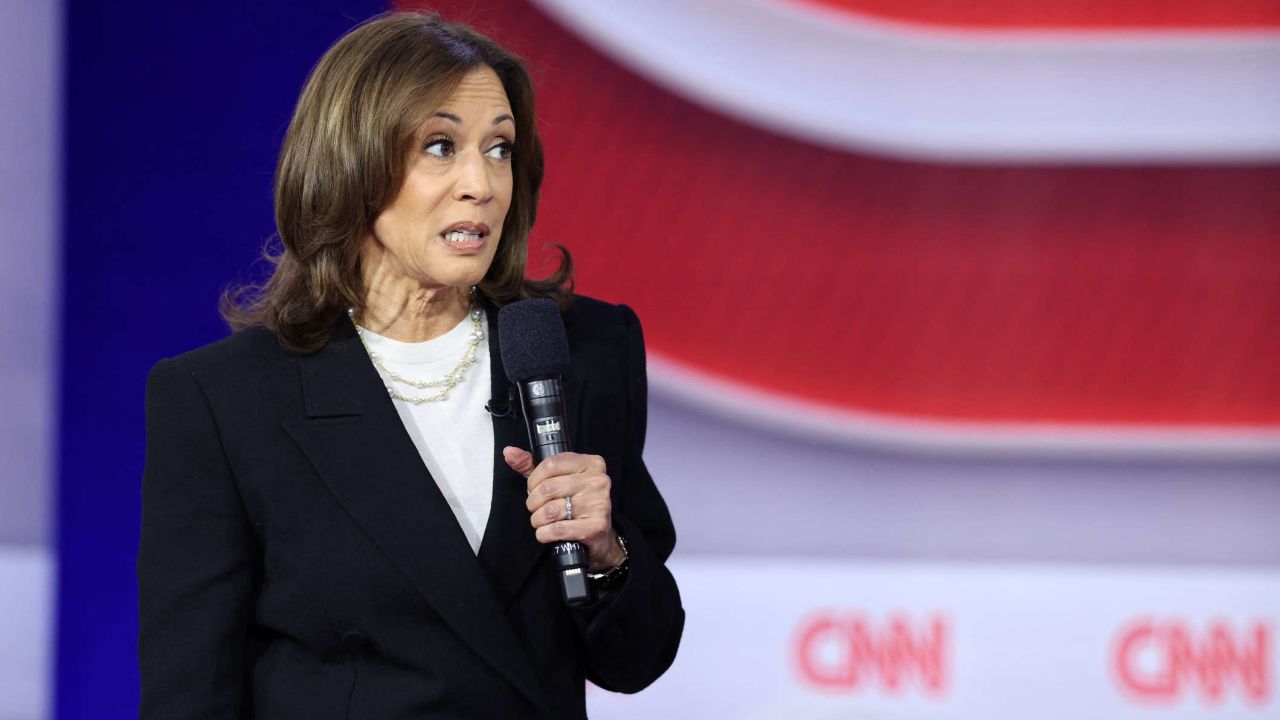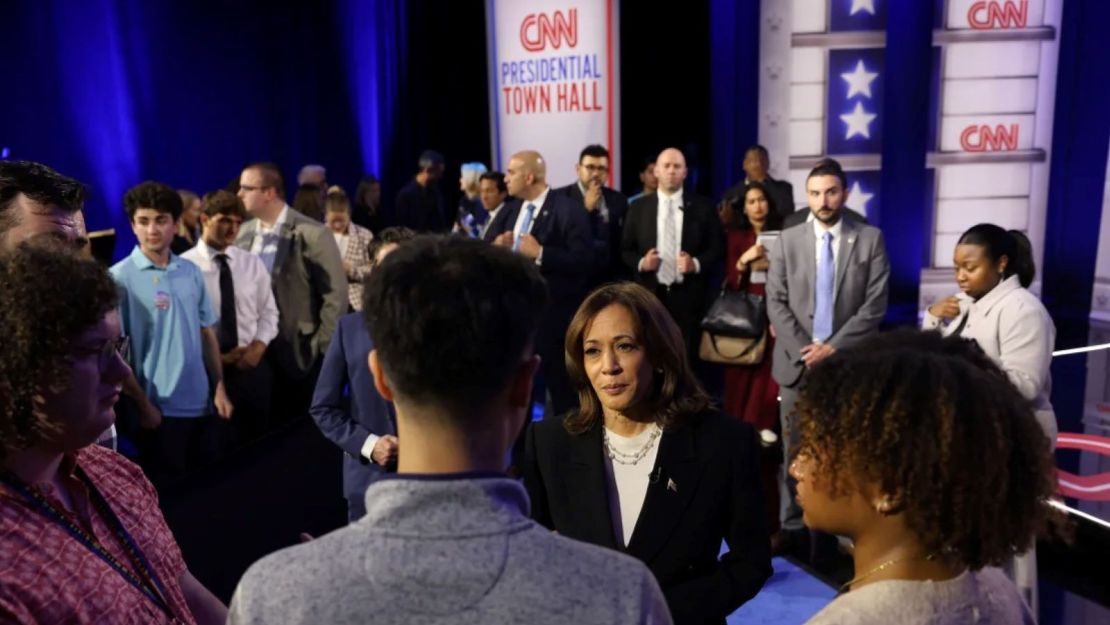() – No presidential candidate in history has had to answer questions about food prices and her opponent’s alleged fascism at the same event.
But the almost absurd link between these two issues that Kamala Harris must face perfectly tells the story of the 2024 elections and the fierce distancing of the United States nine years into the era of Donald Trump.
Shortly after 1:00 pm this Wednesday, the Democratic candidate walked out the front door of her official residence in Washington to ask this question: “What do the American people want?”
He got the answer eight hours later, at a community forum organized by in Delaware County, Pennsylvania, one of the suburbs of Philadelphia where massive participation is needed to defeat the former president in an election that is only 12 days away.
Thirty-two voters still undecided or persuadable sought answers from Harris on the country’s polarized political tumult, on punishing supermarket prices and on an immigration crisis that the Biden administration has struggled to address. He was asked about the deaths of tens of thousands of Palestinians in Gaza. Someone else worried about the rise of anti-Semitism in the United States. Harris was asked to explain her changes to fracking policy and her plans to raise taxes on the rich. One voter asked about his weaknesses. Another wanted to know if the number of Supreme Court justices would increase to 12, a step that would dilute the conservative majority.
Every question Harris received represented an opportunity not just to engage with a single voter, but to reach millions more across the country with the same concerns.
The vice president’s comment about what voters want came after new questions emerged over the past day about Trump’s suitability for office. His former White House secretary general, John Kelly, said in new interviews that the former president met the definition of “fascist” and that he wanted generals like those who served Adolf Hitler. “We know what Donald Trump wants. He wants power without control,” Harris said. “The question in 13 days will be, what do the American people want?”
Trump denied Kelly’s allegations.
The vice president was eager to highlight the perceived threat of a possible second Trump term, saying she agreed he was a fascist and “dangerous” and would use the Justice Department to go after his enemies and “sit there, unstable, unhinged, planning his revenge, planning his retribution, creating a list of enemies.”
It’s too late to sway die-hard Trump voters. To break the tie in national and swing-state polls, Harris needs to unearth persuasive independents, disaffected Republicans – especially women – and younger, low-propensity voters and bring home some Latino and black men who are considering Trump.
So the question is whether the best way to reach those audiences is to issue an emergency warning that Trump represents a mortal threat to American democracy and the Constitution and could usher in a possible autocracy. Or is it emphasizing more mundane issues that are nonetheless existential to voters, such as how much it costs them to feed their children and put a roof over their heads?
The town hall was one of Harris’s last opportunities to force significant changes in the race, but it didn’t appear to do much to alter the dynamic. (Trump was invited but declined to participate in a forum.)
At the end of Wednesday’s event, undecided voters had to face this equation.
Do they choose the vice president despite persistent concerns about her ability to quickly improve her economic situation, the issue that polls show voters worry most about?
Or, will nostalgia for the pre-Trump economy and the Republican strongman’s promise to solve the immigration crisis with hardline policies appeal to the latest swing voters, despite any concerns they may have about four other grueling years of their attacks on the rule of law and democracy?

Kamala Harris mocks Trump’s wall and promises to strengthen the border if she wins the Presidency
Pam Thistle, one of the voters who asked Harris a question, said the personal clashes between Harris and Trump were hurting voters.
“We don’t care, stop trashing Trump. Trump, stop destroying the vice president. We don’t care, the voters don’t care. … We don’t even know the people they’re talking about,” Thistle told ‘s John King after the forum. “How does that affect voters? “They are the ones they are talking to, the ones they are serving.”
And while the allegations against Trump conjure up the possibility of a moment like no other in American history, undecided voters at the event told King they would prefer Harris make a more positive case for what she would do for them.
The forum was a rare challenge for Harris, who has not answered many questions from nonpartisan audiences during her three months at the helm of the Democratic ticket. His performance was varied. She was empathetic. His instinct to preach unity and calm demeanor contrasted with Trump’s sound and fury. He was strongest on issues where he appears to have a solid political base, such as abortion rights.
Perhaps her most effective moment was when she put herself in the position of a voter who supported repealing the federal right to abortion but was concerned about the long-term consequences for women’s reproductive health. “I did not intend for women who suffered a miscarriage to develop septicemia, as has happened many times. “I didn’t mean for women to die,” Harris said, paraphrasing concerns that voter might have.
But an undecided voter hoping for concrete, day-one policies to cut the cost of groceries, which have not returned to previous levels of the now-defunct inflation spike early in Biden’s term, may have been disappointed. The vice president talked about her plan to reduce what she calls price gouging, prevent absentee landlords from acquiring entire blocks of property and stifle competition, and cut red tape to address new housing construction. But none of this was really about how voters’ lives would soon improve.
On immigration, Harris criticized Trump for killing the most conservative border bill in decades, which would have increased resources for an overwhelmed asylum system. But he didn’t have a good answer to moderator Anderson Cooper’s question about why the Biden administration hadn’t taken executive action to significantly slow border crossings three years earlier.
The fact that Harris did not loyally choose this moment to break away from President Joe Biden and say that she herself would have done things differently is something that works in Harris’ favor. But successful politicians sometimes need to show a ruthless streak, and she could have helped her cause by doing so. In fact, although he insisted that “my Administration will not be a continuation of the Biden Administration,” he did not clearly explain what he would do differently.
Throughout her political career, Harris has struggled in unscripted situations when she has been asked to address policies in great depth or give spontaneous responses. Her performance at the forum showed again that she is not a natural politician. When he avoided difficult questions, he did not do so with the fluidity and smoothness of other, more skilled political interpreters. She seemed less comfortable in this environment, in front of voters and Cooper, who dug incisively but respectfully into her empty responses, than she did during her confrontation with Fox News host Bret Baier last week.

But no one expects Harris to become a political natural overnight. The question for a voter still doubting her choice is whether, for all her disadvantages, she is a better bet than Trump and all that he implies.
After all, the spectacle of a former White House secretary general warning that the Republican nominee is actually a dictator in the making constitutes a unique moment in the history of the republic.
It may seem that Trump’s flamboyant behavior and his disregard for laws, decorum and decency make him unpalatable to millions of voters. But the last nine years show that this behavior is also a selling point for a large number of followers who think that the ruling elite does not work for them. Trump may never have surpassed 50% in a national election, but he may never have been as strong politically as he is now, on the cusp of an election that could return him to power.
Still, the thousands of moderate Republicans and women voters who supported former South Carolina Gov. Nikki Haley – many of whom live in the so-called collar counties around Philadelphia – are exactly the type of voters most likely to be offended by the latest apparent evidence of Trump’s extremism. They could decide the fate of a Harris campaign that began with an explosion of joy but has now been reduced to dark warnings about looming autocracy.
As Harris said, Americans will show what they want in 13 days. Actually, it’s already 12 days.



![[Img #74675]](https://thelatestnews.world/wp-content/uploads/2024/12/They-discover-a-new-class-of-X-ray-sources-in-the-150x150.jpg)












Add Comment